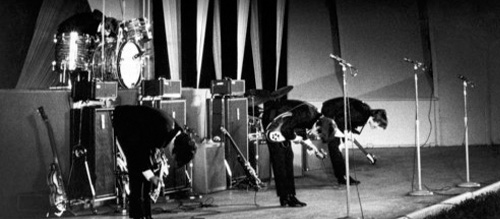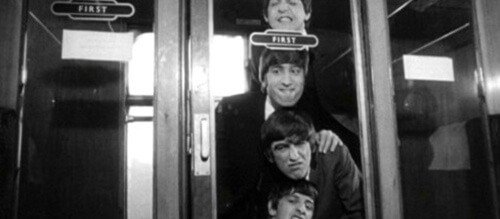A Hard Day’s Night (1964) Retrospective Review
A Hard Day’s Night (1964)
Director: Richard Lester
Screenwriter: Alun Owen
Starring: John Lennon, Paul McCartney, George Harrison, Ringo Starr, Wilfrid Brambell, Norman Rossington, John Junkin and Victor Spinetti
Contemporary analyses on popular media often fixate on the influences of nostalgia and escapism as it is now a universal acknowledgement that the crowds that fill cinemas are seeking some sort of escape route: be it Middle Earth, the Marvel Cinematic Universe or a galaxy far, far away. One unlikely but very strong contender for zapping people away from the 21st century is A Hard Day’s Night – never have 1964 London and Liverpool looked so appealing in all of their black and white glory. For the likes of audiences born after “Let It Be”, there is the overwhelming desire to get the opportunity to experience the hysteria of Beatlemania first-hand; and those lucky enough to have actually been a part of The Beatles’ hey-day are going to wish they can go back to do it all again. Even beyond this retrospective viewpoint, in 1964 it was A Hard Day’s Night that brought the world’s eyes to firmly rest upon the UK, thus letting the British Invasion well and truly let loose.
A Hard Day’s Night is one the greatest PR stunts of all time. Two years prior, The Beatles had their first hit with “Love Me Do” and by the time of the film’s release, they were reaping the rewards of their first three massively successful albums and had triumphantly returned from their now historical world tour.
“How did you find America?”
“Turned left at Greenland.”
In 1964 The Beatles were the hottest sensation in the whole world, driving millions of love-sick teenagers crazy with their catchy bops and hooking in adults with their clever banter popularly showcased through their legendary TV appearances and gigs. It seemed impossible for the Fab Four to acquire greater fame and love but A Hard Day’s Night did just that. With only a few thousand out of their millions upon millions of fans nabbing seats to witness their most famous appearances, the idea of everyone and anyone finally having an intimate hour and a half with The Beatles would have been intoxicating.
The genius of the film lies in its deliberate individuality; unlike the other rock and roll movie efforts from Elvis Presley and Cliff Richard (and funnily enough the rest of the Beatles movies), A Hard Day’s Night follows the style of a Mockumentary, though it does go beyond the expectations established by cinephiles via the likes of This is Spinal Tap as the movie bestows the almost unshakeable reputation that The Beatles are made up of four likely lads from Liverpool.
The film follows John, Paul, George and Ringo on their journey down South to perform a live broadcast of their music from a TV studio with Paul’s “grandfather” in tow. The movie never tries to dupe the audience with fake, constructed personas, but merely sands down the edges of four extremely talented, charismatic and witty young men. Within the first few minutes, their individual characters and personalities become apparent: John, the evil mastermind of chaos; Paul, the charming pretty boy who just wants to enjoy himself; George, devastatingly level-headed, down to Earth and effortlessly cool; and last but not least Ringo, who’s sulky, adorably self-conscious and very much beloved. For the first time ever, fans were able to get to know the real Beatles, in all of their Scouse glory.
By 1964, The Beatles were beginning to earn a reputation for their playful wit, with the likes of John Lennon’s quip at the 1963 Royal Variety Show:
“Would the people in the cheaper seats clap your hands? And the rest of you… if you just rattle your jewellery.”
Alun Owen’s screenplay and Richard Lester’s direction combines the boys’ natural Liverpudlian repartee with lashings of slapstick and surreal comedy, creating something downright bizarre and even magical. Such outlandish moments include the band’s sudden appearance outside their moving train whilst taunting a stuffed shirt – “Can we have our ball back Mister?!” – and of course, John Lennon’s disappearance from the bath. Lester’s orchestration of the lads through these memorable moments upgraded them to the status of some sort of mischievous cosmic imps, making them the perfect voice of youth as they butt heads and infuriate every single authority figure they come across. It’s glorious. From TV directors to police officers, no one is left untouched and all have their cage rattled, embodying the desires of the youth of 1964 (and of all generations that have discovered this movie since). At the time, the significance probably wasn’t realised, but The Beatles’ on-screen mischief was one of the first pre-cursors, or indicators, of the massive social upheaval that was to come in the 1960s; all boiled down into their wry sarcasm:
“I fought the war for your sort!”
“I bet you’re sorry you won.”
Richard Lester’s dab-hand at humour ensures different nuances and gags to discover upon repeated viewings, but the reason audiences continue to return time and time again is The Beatles themselves. To the massive relief of the entire production, the Fab Four turned out to be absolute naturals. Insults and witticisms are dispensed at a pace that would have made Groucho Marx proud; but beyond the comedy, the boys are more than adequate at carrying the story and are even capable of some pathos, especially Ringo. After some vicious stirring by Wilfrid Brambell (of ‘Steptoe and Son’ fame), Ringo does a runner an hour before their live performance, going incognito and generally dicking about. There is an almost bittersweet moment in which Ringo encounters a 10 year old playing truant, made all the more heartfelt and endearing as Ringo’s performance is dominated by the raging hangover he had at the time.
The rhythm and the pace of the movie is driven by the soundtrack comprised of The Beatles’ world-famous music, with the band themselves jumping on screen to the picture’s titular song. There are plenty of articles available regarding the extraordinary hits of the Lennon-McCartney powerhouse, and I do not feel qualified to analyse them at length. However, what is apparent is the boundless energy, enthusiasm, passion and joy the boys have for performing their music. As they play their TV studio gig in the film’s finale, John, Paul, George and Ringo can barely contain their face-splitting grins or suppress their laughter. Looking at their audience, it’s hard to not see why. They are the unsung stars of the movie that required no direction: can any other rock music film boast the deafening screams of thousands of girls on the verge of unconsciousness, overwhelmed by the sight of their idols? A feature length film in its own right could be made from the footage of Beatles fans – teenagers losing their minds, sobbing, shouting and dancing. It’s endearing but more so beautiful: humans have never changed; people have always had the tendency to Fangasm. The movie’s climax is heralded in by “She Loves You”, the song that is proof that anyone who claims they don’t like The Beatles is a liar. Sounding as fresh as when it was first released over 50 years ago, it finishes the film on a positive triumph. As the Fab Four hit us with their “yeah, yeah, yeah”, it takes enormous amounts of self-control to stop yourself from dancing across the living room (but you end up doing it anyway!)
To end on a solemn note, it is difficult to view and analyse A Hard Day’s Night as just a film, with many film buffs and critics agreeing that it is in fact a cultural icon. The film itself is a ship in a bottle, forever preserving The Beatles in what some would say was their peak. At the time of the movie’s production, they were indeed four likely lads from Liverpool; but as Roger Ebert points out, the crushing pressure of their impending enormous fame was soon to come and change their lives irrevocably. Their egos and disenchantment were to grow exponentially and their normality disappear – John Lennon ended up leaving the UK and never returned because of constant mobs and harassment (especially after The Beatles’ break-up). A Hard Day’s Night allows us to turn back the clock and go back to, quite literally, a “simpler time”. For many die-hard Beatles fans, contemplating the band’s demise can be genuinely tear-inducing, but with the likes of A Hard Day’s Night, their music and joie de vivre of their early days will never die.
24/24
[DISPLAY_ULTIMATE_SOCIAL_ICONS]




